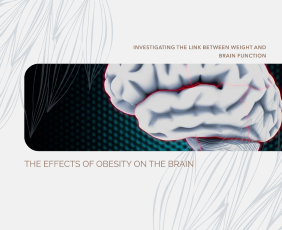Obesity is a major public health problem that affects millions of people worldwide. It is associated with an increased risk of various chronic diseases, such as diabetes, cardiovascular disease, and some cancers. But how does obesity affect the brain, the organ that controls our behavior, cognition, and emotions?
In this article, we will review some of the latest research on how obesity may cause permanent changes in the brain, especially in the regions involved in food intake regulation and reward processing. We will also discuss the implications of these findings for obesity prevention and treatment.
The brain and food intake regulation
The brain plays a crucial role in regulating our food intake and energy balance. It receives signals from various sources, such as hormones, nutrients, and sensory cues, and integrates them to modulate our appetite, satiety, and food preferences.
One of the key brain regions involved in food intake regulation is the hypothalamus, which contains several clusters of neurons that respond to different signals and regulate various aspects of feeding behavior. For example, some hypothalamic neurons are sensitive to leptin, a hormone produced by fat cells that signals the amount of body fat and suppresses hunger. Other hypothalamic neurons are sensitive to ghrelin, a hormone produced by the stomach that stimulates hunger.
Another important brain region involved in food intake regulation is the striatum, which is part of the basal ganglia and plays a role in reward processing and motivation. The striatum contains dopamine neurons that fire when we anticipate or receive rewarding stimuli, such as food, drugs, or money. Dopamine release in the striatum reinforces behaviors that lead to obtaining rewards and motivates us to seek them again.
The striatum also receives inputs from other brain regions, such as the prefrontal cortex, which is involved in executive functions, such as planning, decision making, and impulse control. The prefrontal cortex can modulate the activity of the striatum and inhibit inappropriate or harmful behaviors.
How obesity changes the brain
Several studies have shown that obesity can alter the structure and function of the brain regions involved in food intake regulation and reward processing. These changes may impair the brain’s ability to sense and respond to signals of hunger and satiety, as well as to regulate food preferences and consumption.
One of the main changes observed in obesity is a reduced sensitivity to leptin. Leptin normally acts on hypothalamic neurons to inhibit food intake and increase energy expenditure. However, in obesity, these neurons become less responsive to leptin due to various mechanisms, such as inflammation, oxidative stress, or alterations in leptin receptors. This leads to a state of leptin resistance, where high levels of leptin fail to suppress appetite and promote weight loss.
Another change observed in obesity is a reduced sensitivity to dopamine. Dopamine normally acts on striatal neurons to signal reward value and reinforce behaviors that lead to obtaining rewards. However, in obesity, these neurons become less responsive to dopamine due to various mechanisms, such as downregulation of dopamine receptors or transporters. This leads to a state of dopamine deficiency or blunting, where low levels of dopamine fail to provide sufficient reward and motivation for food intake.
A recent study by Serlie et al., published in Nature Metabolism, provides further evidence for how obesity changes the brain’s response to nutrients. The researchers used functional magnetic resonance imaging (fMRI) and single-photon emission computed tomography (SPECT) to measure brain activity and dopamine release in lean and obese participants after receiving lipids (fats), glucose (sugar), or water directly into their stomachs via a feeding tube.
The results showed that lipids induced a significant decrease in striatal activity and dopamine release in lean participants but not in obese participants. This suggests that lipids normally act as a signal of satiety and reward that inhibits further food intake but that this signal is impaired in obesity.
Glucose also induced a decrease in striatal activity but not dopamine release in lean participants but not in obese participants. This suggests that glucose normally acts as a signal of satiety but not reward that inhibits further food intake but that this signal is also impaired in obesity.
Interestingly, the researchers found no improvement in the brain’s response to lipids or glucose after obese participants lost 10% of their body weight over three months. This suggests that the changes induced by obesity may be permanent or at least long-lasting.
Are these changes reversible?
The findings by Serlie et al., along with other studies , suggest that obesity may cause permanent changes in the brain that affect its ability to regulate food intake and reward. These changes may explain why it is so difficult for many people to lose weight and maintain weight loss, as they may experience persistent hunger, reduced satisfaction, and increased cravings for high-calorie foods.
However, these findings do not mean that obesity is inevitable or untreatable. There are still many factors that influence our food intake and energy balance, such as genetics, environment, lifestyle, and psychology. Moreover, there are still many gaps in our understanding of how obesity affects the brain and how these effects can be reversed or prevented.
Therefore, more research is needed to identify the mechanisms, causes, and consequences of obesity-induced brain changes and to develop effective strategies to counteract them. These strategies may include pharmacological interventions, such as drugs that target leptin or dopamine receptors, behavioral interventions, such as cognitive training or mindfulness, or dietary interventions, such as calorie restriction or intermittent fasting.
In conclusion, obesity is a complex and multifactorial condition that can have profound effects on the brain. These effects may impair the brain’s ability to regulate food intake and reward and may persist even after weight loss. However, these effects are not irreversible or insurmountable. With more research and innovation, we may be able to find better ways to prevent and treat obesity and its associated brain changes.
